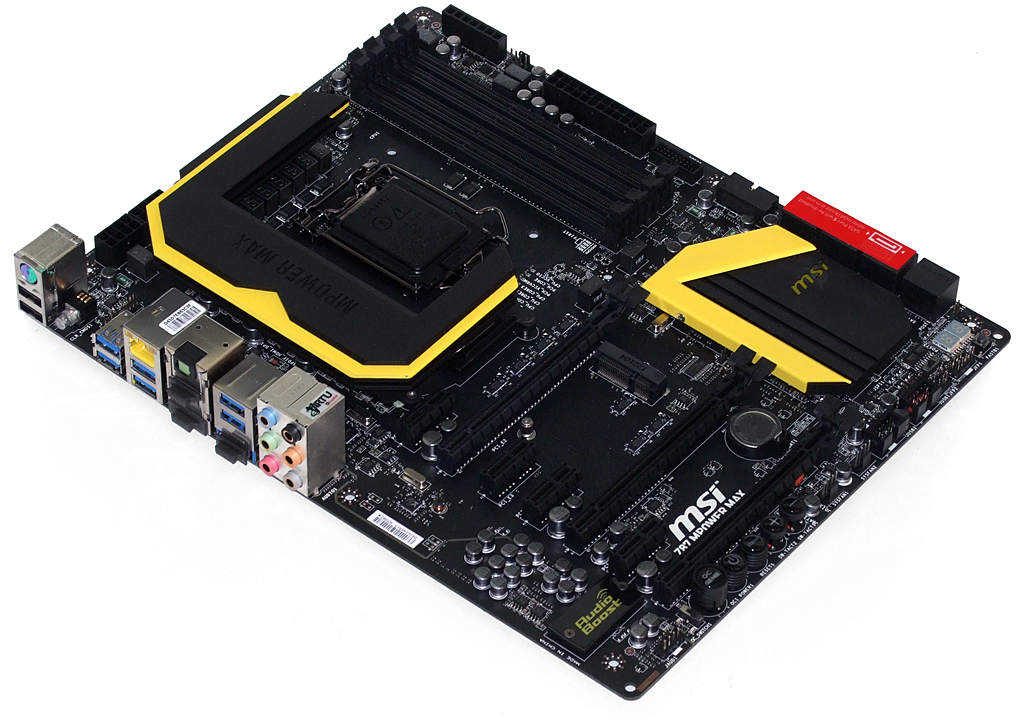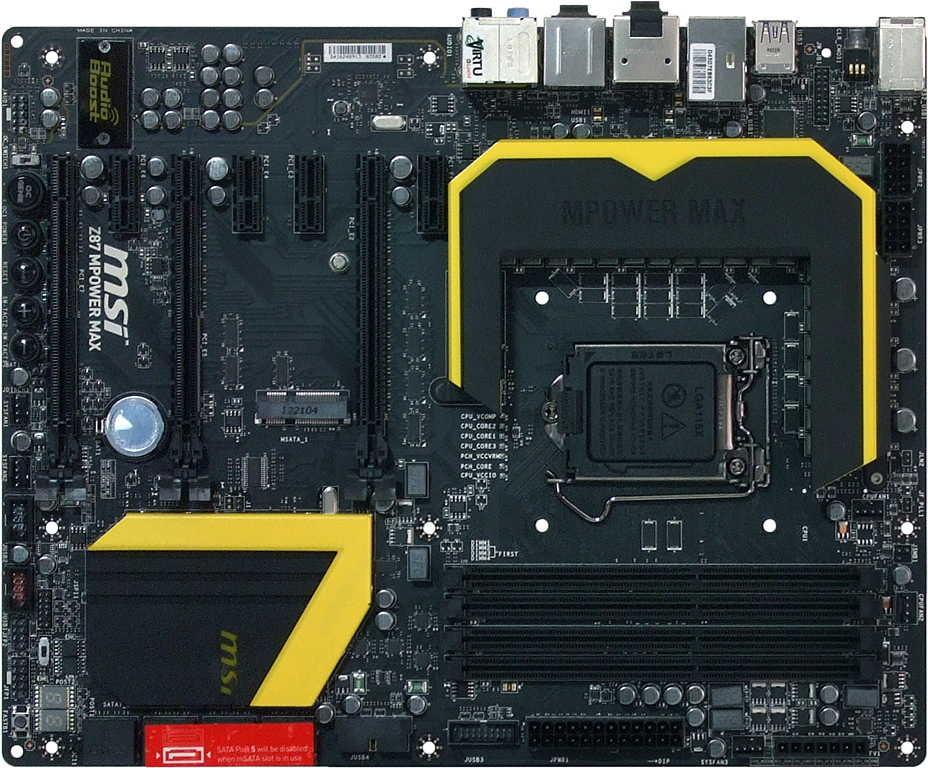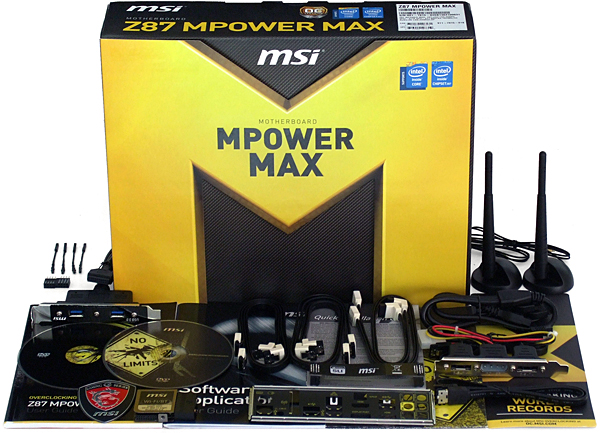Z87 Hits The High End: Four Sub-$300 Motherboards
Situated barely below the priciest premium boards, which typically exceed $300, high-end Z87 Express-based motherboards offer enthusiasts almost everything they could want except for three-way SLI support. We put four of these platforms to the test.
MSI Z87 MPower Max
Why you can trust Tom's Hardware
The second-least-expensive platform in this round-up, MSI’s Z87 MPower Max is far from cheap when it comes to on-board features. An Intel Centrino Wireless-N 2230 plus Bluetooth adapter comes factory-installed on an I/O panel riser card that fits between a CLR_CMOS button and two of the board’s six rear-facing USB 3.0 ports.
MSI makes room for the module by ridding the board of DVI connectivity, though the dual HDMI outputs can be used with single-link adapters. Users who want more resolution from Intel’s integrated HD Graphics 4600 engine instead need to use the Z87 MPower Max’s DisplayPort output.
Like all of the board’s in today’s comparison, MSI's Z87 MPower Max shares the CPU’s sixteen PCIe 3.0 lanes in x16, x8-x8, or x8-x4-x4 modes, depending on the slots you fill. Remaining slots are closed-ended second-gen PCIe x1 links connected to the Z87 PCH.
Lane sharing isn’t an issue for the chipset, since its remaining four lanes feed exactly four devices. Controllers include the high-end E2205 from Killer Networks, the D720202 USB 3.0 hub from Renesas, the previously-mentioned Intel wireless controller on a custom riser card, and ASMedia’s ASM1061 dual-port SATA 6Gb/s.
Because MSI chooses a two-port add-in controller, the Z87 MPower Max comes up two SATA ports shy of its competition. The PCH still provides six of its own SATA 6Gb/s ports, and even most high-end users have fewer than the eight storage devices. One of those ports becomes inactive when an mSATA drive is installed in the board’s center connector, but building with mSATA can also help mitigate cabling nightmares.
The Z87 MPower Max voltage regulator cooler also lacks the liquid-cooling attachments found on ASRock's and Asus' samples, though the components it covers consist of a far more elaborate 20-phase design. The regulator also features flat Tantalum capacitors for additional CPU cooler clearance and heat resistance.
Similar to what we saw from Asus and Gigabyte, the Z87 MPower Max employs a good layout designed for extra graphics cooling in SLI or CrossFire. On the other hand, some case manufacturers still haven’t learned to make their front-panel audio cables long enough to reach this board’s bottom-rear corner connector.
The Z87 MPower Max includes six SATA cables, a slot-panel breakout plate for two of its four internal USB 3.0 connections, a dual-port eSATA breakout panel, a single-channel Wi-Fi module with two extended range antennas, and four connector cables for its seven voltage detection points.
Current page: MSI Z87 MPower Max
Prev Page Z87X-UD5H Firmware Next Page Z87 MPower Max Special FeaturesGet Tom's Hardware's best news and in-depth reviews, straight to your inbox.
-
vipervoid1 Reviewer seems like not really like MSI ~Reply
Always favoring Asus, ASRock and Gigabyte ~
No matter how less differences between each board ~
MSI Motherboard , the reviewer never have comment ~
I am a MSI brand fans , I admitted it , but the reviewer seems like ignored MSI's afford. -
slicedtoad Haswell motherboard guide: pick whichever looks best and has the right I/O. Performance-wise, they're all the same.Reply -
Crashman Reply
In the award contest between MSI and Gigabyte, Gigabyte would have probably won the award. The problem for Gigabyte is that it's new price is too cheap to compete in a $220-300 roundup.11638734 said:Reviewer seems like not really like MSI ~
Always favoring Asus, ASRock and Gigabyte ~
No matter how less differences between each board ~
MSI Motherboard , the reviewer never have comment ~
I am a MSI brand fans , I admitted it , but the reviewer seems like ignored MSI's afford.
Let's take a look at the article:11638739 said:And also dont have MSI software feature in the review ~
The Z87 MPower Max comes with the exact software suite and tuning application as its previously-reviewed sibling. Rather than repeat our analysis of those tools and utilities, we'll move on to the board’s firmware specifics.
Let me see if the department of redundancy department has a better explanation.
Correct. Pick on features, price, overclocking, warranty, criteria that best match your own preferences. The benchmarks only point out when someone is cheating in reviews or has a flaw. And why point out cheating? Because it's what some of these companies use to get their awards from OTHER sites, and someone has to dispel those myths.11638770 said:Haswell motherboard guide: pick whichever looks best and has the right I/O. Performance-wise, they're all the same.
-
jimmysmitty Reply11638734 said:Reviewer seems like not really like MSI ~
Always favoring Asus, ASRock and Gigabyte ~
No matter how less differences between each board ~
MSI Motherboard , the reviewer never have comment ~
I am a MSI brand fans , I admitted it , but the reviewer seems like ignored MSI's afford.
After working in retail for a while you tend to see trends with motherboard manufactures. From what I have seen, Asus tends to have the overall most stable quality with the least amount of issues and very decent support for BIOS updates for newer CPU support beyond most.
ASRock has upped their game in recent years and has put more quality into their boards but they also have a lot of features much like Asus since they were once a part of ASUSTek and separated although Asus did put in a bid to buy them back but I haven't seen any word from them.
Gigabyte is a hit or miss. Their high end seems very good but their low end sometimes lacks.
Then there is MSI. I am not a fan of MSI. The TwinFRZR branded GPUs had a lot of issues, mainly the fans going out very fast. But I think there are two components that kill them for me the most. One was the massive heat issues their X58 boards had with the chipsets on a large number of their boards. We had a X58m from MSI that was idling at 58-60c for the chipset in BIOS doing nothing and we RMAed it. Came back with the same problem. Due to this heat most of the MSI X58 builds we did would lose SATA and come back sometimes on reboot. Had one customers machine that we went from a ATX X58 to a X58M and finally swapped them to an Asus which the chipset idled around 35c which is normal.
The second for me was the BIOS updates on a lot of their boards. Now I can't say on their high end but recently MSI stopped allowing you to update through the BIOS and instead only offered a Windows based app to update and that is just bad. If you bought a MSI with a CPU and it didn't support it, rather then being able to drop an older CPU in and flash it, you have to do an entire build including Windows installation to do it which is a waste of time. USB via BIOS is the best method and now Asus even has the ability to do it sans CPU so if you bought a CPU that needs a BIOS update, no biggie.
That's what I see of the brands. I tend to stick to Asus as they have always worked for me but I have experienced a lot and the article is fine. Its looks at the important features, as the majority of the software is not needed anyways and just bloat, and grades it from that.
What I want to know is why a ROG Asus board has RealTek sound instead of Asus own sound. RealTek is fine for those who don't care but for real sound Asus/Creative offer way better solutions. Then again it is appealing to overclockers mostly. -
vipervoid1 Reply11638928 said:11638734 said:Reviewer seems like not really like MSI ~
Always favoring Asus, ASRock and Gigabyte ~
No matter how less differences between each board ~
MSI Motherboard , the reviewer never have comment ~
I am a MSI brand fans , I admitted it , but the reviewer seems like ignored MSI's afford.
After working in retail for a while you tend to see trends with motherboard manufactures. From what I have seen, Asus tends to have the overall most stable quality with the least amount of issues and very decent support for BIOS updates for newer CPU support beyond most.
ASRock has upped their game in recent years and has put more quality into their boards but they also have a lot of features much like Asus since they were once a part of ASUSTek and separated although Asus did put in a bid to buy them back but I haven't seen any word from them.
Gigabyte is a hit or miss. Their high end seems very good but their low end sometimes lacks.
Then there is MSI. I am not a fan of MSI. The TwinFRZR branded GPUs had a lot of issues, mainly the fans going out very fast. But I think there are two components that kill them for me the most. One was the massive heat issues their X58 boards had with the chipsets on a large number of their boards. We had a X58m from MSI that was idling at 58-60c for the chipset in BIOS doing nothing and we RMAed it. Came back with the same problem. Due to this heat most of the MSI X58 builds we did would lose SATA and come back sometimes on reboot. Had one customers machine that we went from a ATX X58 to a X58M and finally swapped them to an Asus which the chipset idled around 35c which is normal.
The second for me was the BIOS updates on a lot of their boards. Now I can't say on their high end but recently MSI stopped allowing you to update through the BIOS and instead only offered a Windows based app to update and that is just bad. If you bought a MSI with a CPU and it didn't support it, rather then being able to drop an older CPU in and flash it, you have to do an entire build including Windows installation to do it which is a waste of time. USB via BIOS is the best method and now Asus even has the ability to do it sans CPU so if you bought a CPU that needs a BIOS update, no biggie.
That's what I see of the brands. I tend to stick to Asus as they have always worked for me but I have experienced a lot and the article is fine. Its looks at the important features, as the majority of the software is not needed anyways and just bloat, and grades it from that.
What I want to know is why a ROG Asus board has RealTek sound instead of Asus own sound. RealTek is fine for those who don't care but for real sound Asus/Creative offer way better solutions. Then again it is appealing to overclockers mostly.
Actually myself currently using MSI P45 Platinum, I dont know their new product quality, but my current motherboard work for me for 5-6 years 24 hours operation still running well ~
Even without driver on windows 8 still working well after used windows 8 for sometime ~
I am going to upgrade this to Z87 Mpower in next year ~
Btw my current build by my brother ~
I going to build another setup based on MSI Z87 Mpower ~
My Brother can flash the BIOS well with MSI Live Update ~
It work well ~
Now my setup running stable with latest BIOS ~ -
vipervoid1 Reply11638803 said:
In the award contest between MSI and Gigabyte, Gigabyte would have probably won the award. The problem for Gigabyte is that it's new price is too cheap to compete in a $220-300 roundup.11638734 said:Reviewer seems like not really like MSI ~
Always favoring Asus, ASRock and Gigabyte ~
No matter how less differences between each board ~
MSI Motherboard , the reviewer never have comment ~
I am a MSI brand fans , I admitted it , but the reviewer seems like ignored MSI's afford.
Let's take a look at the article:11638739 said:And also dont have MSI software feature in the review ~
The Z87 MPower Max comes with the exact software suite and tuning application as its previously-reviewed sibling. Rather than repeat our analysis of those tools and utilities, we'll move on to the board’s firmware specifics.
Let me see if the department of redundancy department has a better explanation.
Correct. Pick on features, price, overclocking, warranty, criteria that best match your own preferences. The benchmarks only point out when someone is cheating in reviews or has a flaw. And why point out cheating? Because it's what some of these companies use to get their awards from OTHER sites, and someone has to dispel those myths.11638770 said:Haswell motherboard guide: pick whichever looks best and has the right I/O. Performance-wise, they're all the same.
Thanks for correcting me ~
I also didnt read well the review ~
Btw I really proud of being a MSI user ~ -
Crashman Reply
They make great boards, I have no problem with them.11639187 said:Btw I really proud of being a MSI user ~



